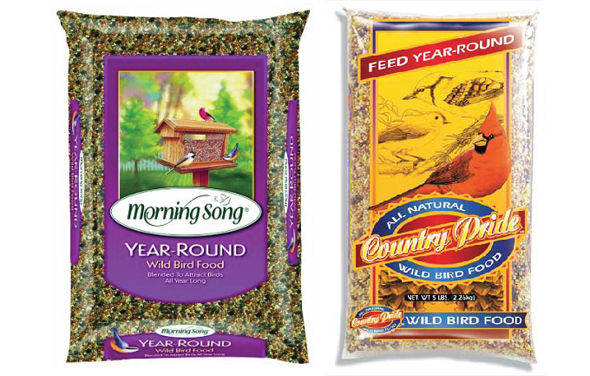
Last week, the Environment News Service reported: “Ohio lawn and garden care company Scotts Miracle-Gro has pleaded guilty to breaching federal pesticide laws by using an unapproved insecticide on bird seed sold nationwide for two years.”
“Scotts is proposing to pay a $4 million fine and give $500,000 to help support wildlife conservation and study. Judge Graham said he will issue his decision on the plea agreement at sentencing, which has not yet been scheduled. The government alleges that beginning in 2005, Scotts produced a line of wild bird food products under names including Morning Song and Country Pride that contained insecticides.
The government says the insecticides, which are toxic to birds and other wildlife, were not approved for use on bird food.
According to court records, in 2008, Scotts distributed 73 million packages of bird seed coated with the insecticides Storcide II containing the active ingredient chlorpyrifos, and Actellic 5E, containing the active ingredient pirimiphos-methyl, intended to keep insects from destroying the seed.
The company continued to produce and market the insecticide-coated seeds despite being alerted to toxicity dangers by a Scotts staff chemist and ornithologist.
Storcide II is labeled as ‘Toxic to birds. Toxic to wildlife,’ and that ‘Exposed treated seed may be hazardous to birds.’ No such warning exists on the Actellic 5E label.”
Reaction to the decision has been interesting
The SafeLawns blog, for example, referred to the timing as “suspicious.”
“The company, many folks believe, must have known this ruling in federal court was coming down for several months. The timing of the sponsorship with the National Wildlife Federation, announced by NWF on Jan. 18, was clearly designed to draw attention away from what is believed to be the largest fine ever levied on a pesticide company.”
It may very well be the largest fine of its kind—but let’s put this into context. Scotts’ net sales for fiscal 2011 were $2.84 billion, one billion of which was profit.
The American Bird Conservancy announced the decision in a February 7 media release in which ABC referred to results of its own recent independent testing of bird seed bought at Wal-Mart, Home Depot, Lowes, and Target. The analysis, conducted at the California Animal Health and Food Safety Laboratory System, part of the University of California, Davis, “specifically looked for harmful pesticides, such as organophosphate and carbamate insecticides.”
“We found that all of the tested bird seed was either free from pesticides or that pesticides occurred at only trace levels that would not threaten bird health,” said ABC president George Fenwick.
Now, the chlorpyrifos found in Storcide II is an organophosphate insecticide, but it seems likely that ABC’s testing was conducted long after the Scotts products were on the shelf. (And, it should be made clear, it’s not known if the various products tested at UC Davis included Scotts’ Morning Song and Country Pride.)
Statements made in the 2011 media release announcing the test results now have, in light of the Scotts case, an irony to them: “The potential for birds to be unwittingly poisoned by the very people who feed them was something we felt it important to know, so we could either raise the alarm bell or put people’s mind at rest,” said Dr. Moira McKernan, director of ABC’s Pesticides and Birds Program… We wanted to make sure that the isolated problem cases in the past, were indeed behind us, and as far as we can tell, that is the case. The bird seed producers seem to be doing a good job of producing a safe product.”
“This testing produced very positive findings,” McKernan continues, “but I think it is probably in the best interests of birds that if we identify funding sources, we perform some form of periodic analysis to make sure that we can all continue to buy bird food products with peace of mind, and to ensure that people’s hard earned money is spent helping birds, and not unintentionally harming them.”
In the February 7 release, Fenwick echoes McKernan’s comments: “in the light of this recent case against Scotts, this is clearly an issue that requires greater public attention. ABC seeks additional funding for continuing, needed testing.”
• • •
What I find rather unsettling about ABC’s response (in addition to its use as a fundraising opportunity) is its… restraint. Compared to, in particular, their various claims made about the impacts of free-roaming cats.
Speaking of which…
It’s been demonstrated that, on average, birds caught by cats are significantly less healthy than birds killed through non-predatory events (e.g., collisions with windows or cars) [1, 2]. One wonders what role tainted bird seed might play in such findings.
Note: I asked ABC’s director of public relations, Robert Johns, by e-mail, whether ABC expects to receive any of that $500,000 Scotts is promising “to help support wildlife conservation and study.” So far, no reply.
Update: According to The Columbus Dispatch, the $500,000 “will be evenly split among five groups and agencies to fund efforts to protect birds. They are Audubon Ohio, the Ohio Department of Natural Resources Urban Forestry Program, Columbus Metro Parks, the Cornell Lab of Ornithology, and the Ohio Nature Conservancy.”
Literature Cited
1. Møller, A.P. and Erritzøe, J., “Predation against birds with low immunocompetence.” Oecologia. 2000. 122(4): p. 500–504. http://www.springerlink.com/content/ghnny9mcv016ljd8/
2. Baker, P.J., et al., “Cats about town: Is predation by free-ranging pet cats Felis catus likely to affect urban bird populations?“ Ibis. 2008. 150: p. 86–99. http://www.ingentaconnect.com/content/bsc/ibi/2008/00000150/A00101s1/art00008
